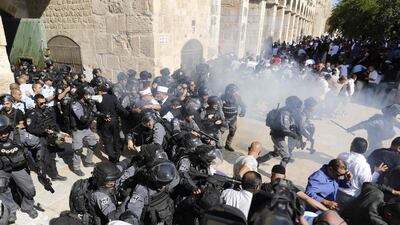The clashes at Al Aqsa mosque in East Jerusalem on Sunday cast a shadow of political reality on US plans for a solution to a historical problem that Washington has come to see mostly in terms of costs and benefits.
Israeli police fired sound grenades at worshippers enraged by Jews being allowed to enter a holy site that is at the centre of Palestinian national identity, as well as being the third most sacred in Islam.
In the 1990s, members of the Palestine Liberation Organisation threatened Palestinian poet Mahmoud Darwish with violence because of his criticism of the PLO.
The matter came to the attention of Yasser Arafat, who called in his aides in Ramallah.
“Mahmoud Darwish is our Al Aqsa," he told them, signalling that Darwish was untouchable.
Al Aqsa's importance has made it near impossible for Palestinian leaders to compromise their people's rights to the site, and US President Donald Trump’s peace plan is unlikely to offer a solution not tilted in Israel’s favour.
The economic part of his plan, unveiled at an international conference in Bahrain last month, suggests that if the Palestinians were offered enough economic incentives they would accept US proposals for a peace deal that would give them far less politically than they have been offered under past US presidents.
While the political component of the US plan has not been unveiled, it is unlikely to temper in any major way what Israel regards as its “indivisible” capital of Jerusalem.
This includes Al Aqsa in East Jerusalem, which Israel captured in 1967 and later annexed in a move never recognised by the international community.
Not a single major Palestinian figure attended the Bahrain conference on the grounds that it ignored their rights enshrined in international law.
Jared Kushner, Mr Trump’s adviser and son-in-law and the architect of the plan, said that if Palestinians had workable suggestions for peace they were welcome to bring them to the table.
But with Al Aqsa, Palestinian options beyond a status quo are limited. Any perceived sellout by Palestinian Authority President Mahmoud Abbas would play to the advantage his Iranian-backed rivals Hamas.
Many of the Palestinians who took part in the clashes on Sunday might not have much faith in Mr Abbas's leadership, but they firmly back his opposition to the US peace plan.

